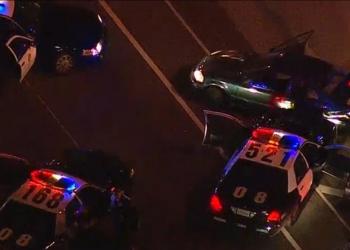
Multiple police officers contacting persons on the street, with a police vehicle’s emergency lights
The use of a patrol vehicle’s emergency lights and four officers surrounding a suspect’s vehicle constitutes a detention which, if not supported by at least a reasonable suspicion, is illegal. Information from a private citizen, as reported to the police, that persons are engaged in “shady activity,” without further explanation, is insufficient to constitute the reasonable suspicion necessary to justify a detention.
On March 13th, 2019, at around 6:00 p.m. four San Diego patrol officers were handling an unspecified issue in the Encanto neighborhood of southeast San Diego when they were approached by a woman who drove up in her car and stopped to talk to them. She told one of the officers (as recorded [without audio] on the officer’s body worn camera in a short 40 second conversation) that she lived nearby, and provided her address. She complained to the officer that there were some black males in a parked black Mercedes on her street who were “acting shady.” There was no explanation as to specifically what these individuals were doing that she considered to be “shady,” and the officer apparently didn’t think to ask her to elaborate. All four officers, in two marked patrol vehicles, drove to that location and found the Mercedes where she said it would be, legally parked, and with three young black males sitting inside. Two of the officers pulled up directly behind the Mercedes, activating their vehicle’s emergency lights as they did so. The other two officers parked immediately behind the first patrol car without activating their lights. All four officers approached the Mercedes at once, positioning themselves at each of the car’s four doors. The three teenage occupants were contacted, “directed to roll down their windows, hand over proof of identification, and provide their names, addresses, and birthdays.” Defendant Edgerrin J., sitting in the driver’s seat, initially gave a false name, but was quickly identified and found to be subject to a Fourth waiver condition of probation. Co-defendant Jamar D. was a passenger. (The third occupant, referred to only in a footnote as “D.W.,” is not further mentioned in this written decision and was not a party to this appeal.) Upon searching the Mercedes pursuant to defendant’s Fourth waiver, a loaded firearm was found under the driver’s seat. Also recovered was a pair of sneakers, determined to be connected to a robbery, and a canister containing marijuana. All three minors were arrested. The San Diego County District Attorney filed W&I Code 602 petitions in Juvenile Court, accusing defendant Edgerrin and co-defendant Jamar of robbery, receiving stolen property, and various weapons-related charges, along with associated enhancements. Defendant Edgerrin was additionally charged with providing false information to a police officer. Defendants’ joint motions to suppress the evidence obtained from the Mercedes was denied by the Juvenile Court magistrate, he finding that the contact constituted a consensual encounter only and rejecting the defendants’ arguments that they had been unlawfully detained. Both defendants (after admitting to selected allegations in a plea bargained disposition) appealed.





